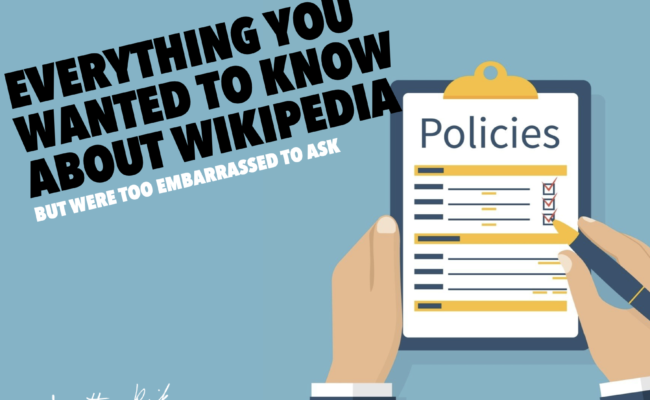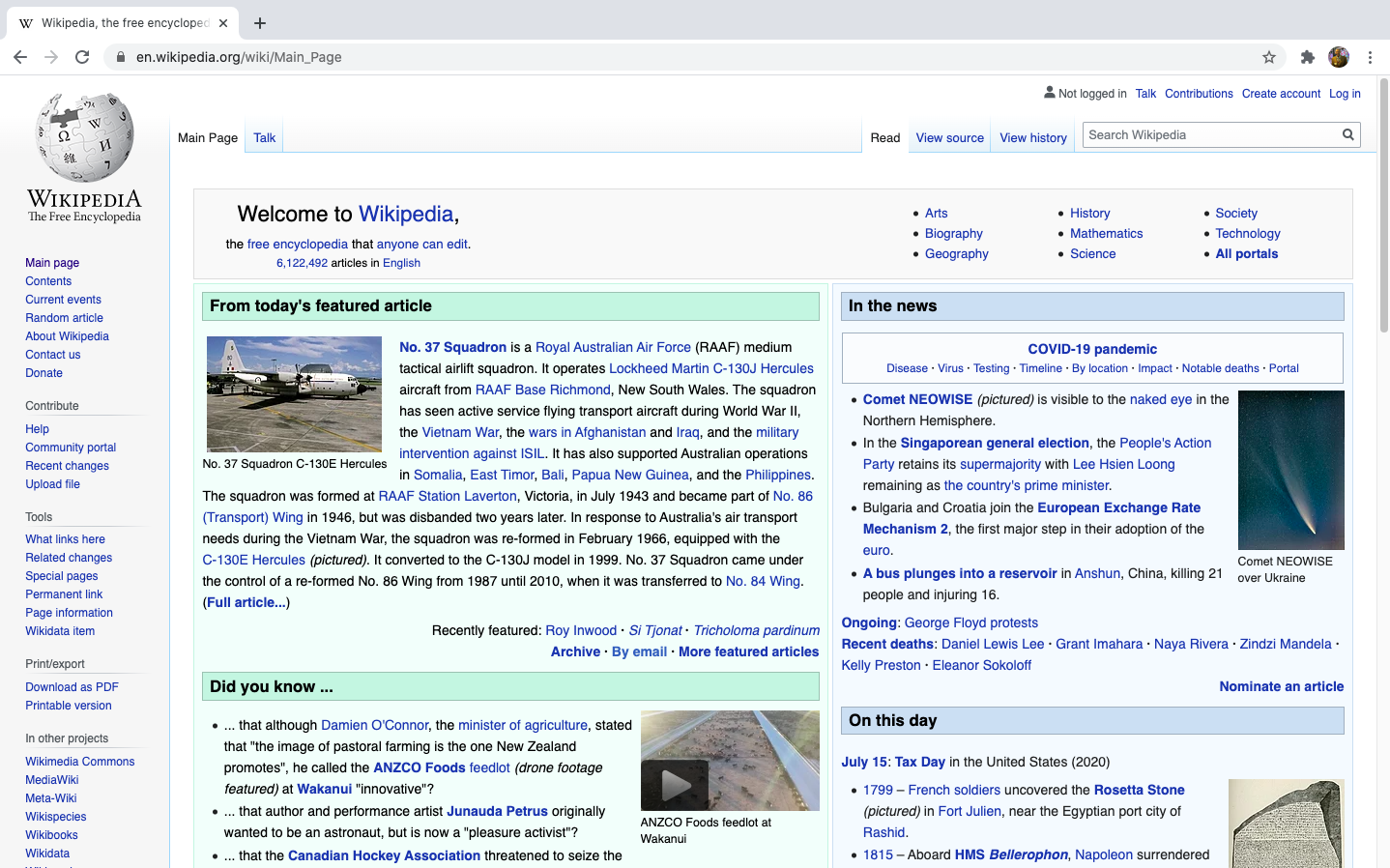Do you want to create a Wikipedia page for yourself? Perhaps the page you drafted is bumping into Wikipedia’s notoriously opaque and unforgiving submission process? Maybe you’re mired in an edit war?
You’ve come to the right place.
I’ve been writing and editing Wikipedia pages for 20 years, both professionally and personally. Not only am I thoroughly conversant with the encyclopedia’s policies; I can also translate this esoterica into English.
For example, every claim you make needs to be footnotable — with a link. So, let’s say you were named one of America’s top neurosurgeons in 2015. Yet the only evidence online comes from bios you’ve written. For these reasons, we can’t cite this award; we need documentation from a high-authority third party.
Those two descriptors — “high authority” and “third party” — are critical; each link we use must come from a website that’s independent from you and which has a reputation for accuracy. Such sources are almost always major media outlets, though in certain cases we can cite government agencies, academic publishers, and industry-leading research outlets.
Why such stringency? Wikipedia’s rules are a big reason the website maintains its reputation as everyone’s go-to for unbiased facts.
Process
I follow a four-part process:
1. Hold a Kick-Off Call
We’ll discuss Wikipedia’s requirements and your vision for the page, then agree on an outline.
2. Conduct Research
You know the material best, so please share any links that bolster your case for notability. The more info I have, the more effective I’ll be. I’ll combine your links with my own research.
3. Develop Your Page
I’ll translate the above info into a proposed page. If you have edits, we can discuss them on the phone; you can mark up the Word doc using Track Changes; you can email me — whatever’s easiest.
4. Publish Your Page
Upon your approval, I’ll work with the Wikipedia community to submit your requests. To minimize pushback, I’ll proceed on a piecemeal basis.
Frequently Asked Questions
Question: How Much Does This Cost?
Because each page is unique — different levels of research, different lengths of text, different potential for pushback — I don’t use set rates. Nor do I bill hourly. Instead, after evaluating your media coverage (if you want to create a page) or your list of changes (if you want to edit a page), I offer a custom quote.
Question: Can You at Least Give Me a Range?
I hesitate to do so. Let’s say I quote you $50 – $100. Well, most people focus on the $50. Some people assume $75. But no one thinks $100. As a result, if the actual cost is anything above $75, you feel you’re getting squeezed.
That said, I know price is important, so here’s what I can tell you: Wikipedia work is expensive. It requires specialized expertise and is an investment in your digital reputation.
Also worth considering: A third of my clients try to tackle Wikipedia by hiring someone through a website like Upwork. Invariably, their submission gets rejected or flagged, because the knowledge required to navigate Wikipedia is so esoteric.
Question: If I Provide the First Draft, Will This Lower the Price?
That’s certainly helpful, but it won’t appreciably cut my workload. I still need to conduct my own (extensive) research to grok your media coverage, and I still need to footnote every single claim.
Let me put the point this way: I pride myself on quality, so I don’t take shortcuts when it comes to understanding and positioning your brand.
Question: Will My Page Get Vandalized?
Wikipedia boasts a rapid record of self-correction. As reporter Stephen Harrison, who covers Wikipedia for Slate, has observed: “Although there are still instances of vandalism today, those issues are often fixed very quickly, usually within a few minutes … Point enough smartphones on Wikipedia, and the crowd will quickly spot graffiti.”
An article in Bloomberg Businessweek concurs: “Wikipedia editors make mistakes, but the site is self-correcting, and the kind of viral misinformation that spreads endlessly on Facebook and X tends to be removed instantly.”
Indeed, according to scholarly studies, Wikipedia has marginalized editors known for their fringe views.
In other words: I wouldn’t worry about edits that are provably false. If they’re not reverted by the community, they are relatively easy to undo through a formal request.
Question: Should We Send Wikipedia a Cease-and-Desist Letter?
With the caveat that I’m not a lawyer and can’t provide legal advice, I recommend that you use the legal route as a last resort, not a first foray. Making a threat rarely has the effect you want. Instead, it may end up triggering more scrutiny, thus making a solution harder — and more expensive. In my experience, it’s both more effective and cheaper to engage editors in an open way.
Question: Can You Guarantee Success?
Here’s the short answer: I’ve been doing Wikipedia work for almost 20 years, and I don’t take on clients that I’m not confident I can help.
And here’s the long answer: Wikipedia is similar to public relations generally, and earned media specifically, in that there are no guarantees. In fact, any consultant who guarantees a result is grossly misrepresenting both their services and the way the encyclopedia works.
That said, in creating a new page, if our submission gets declined, then I’ll develop a response and adjust the proposed text accordingly. For example, if an editor asks for additional info, we may need to emphasize a different angle.
Similarly, if we’re improving an existing page and a request of ours gets declined, then I’ll politely but firmly push back as circumstances warrant, or level with you that we need to choose our battles.
The bottom line: In hiring me, you get an advocate who will make a case that’s cogent, clear, and comprehensive. I’ll balance your requests against Wikipedia’s rules, and I’ll use my experience and judgment to best position and advance your story.
Question: How Long Will This Take?
Wikipedia relies on volunteers to field requests from those with a conflict of interest — this includes both you and me — so our requests could get addressed in a couple of days or weeks, or they could take several months.
While there’s no way to cut the line, there are ways to fast-track a request. For example, we can tag pertinent editors, or we can post to the pertinent noticeboard.
Equally important: We must present our requests in a way that’s comprehensive yet succinct, and to reference the pertinent Wikipedia policies.
Finally, and above all, patience is key. There’s nothing worse, from an editor’s perspective, than someone who’s being paid following up with someone who volunteers their time. (There’s even an informal Wikipedia rule titled, “There is no deadline.”)
Ongoing Protection
After their pages are live, many clients want to ensure that they stay that way — specifically, that the text remains CAP (current, accurate, and positive). To these ends, I offer two plans:
1. A Monthly Retainer
If you’d like your reputation to be protected on a continuing basis, I can take this responsibility off your plate. This way, you won’t need to monitor your page every day. Instead, whenever a change is made, I’ll alert you in real time, recommend a solution, and then work with the Wikipedia community to implement it. Similarly, if you’d like to make a change yourself, I’ll do so (again, within the encyclopedia’s rules).
2. À-La-Carte Pricing
Alternatively, your team can monitor your page on their own. When you spot a problem or want to make an update, I can address the given issue on an à-la-carte basis.
Browse My Work

Here’s my white paper on what everyone needs to know about Wikipedia. I hope you you’ll read this explainer, since with Wikipedia, what may seem obvious or commonsensical often turns out to violate one of the site’s myriad rules.
Testimonials
Don’t take my word for it; listen to my clients:
“Jonathan is among the most reliable and responsive professionals with whom I’ve ever worked. His recommendations are spot-on and his follow-through is thorough and effective. I recommend his services to anyone seeking creative solutions that make a real difference in the bottom line.” —Gene Grabowski, kglobal
“You gave us so much to work with, and our work is so much better thanks to your skills and research! You really captured the essence of the client, its ethos, and its future. We are beyond grateful for your expertise and clever and insightful writing.” —Grace Leong, HUNTER
“Jonathan is a master marketer. He possesses that rare combination of being able to create a compelling message and leverage technology for widespread impact. Jonathan is a true leader in his field, respected by his peers and extremely knowledgeable about the latest trends, strategies, and tactics.” —Greg Galdabini, HudsonLake Strategic Communications
Intrigued?
I offer all prospective clients a free, no-strings-attached consultation.
Let’s chat!

